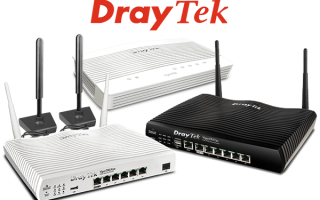A guide to PDUs and ATSs to improve your understanding of what your unique business needs
Shining a Pink Light: Breast Cancer Awareness Month
Every October, a wave of pink takes over the world. From pink ribbons adorning lapels to illuminated buildings bathed in pink light, Breast Cancer Awareness Month is a global movement to raise awareness about one of the most common and, unfortunately, deadly cancers affecting women today. In this blog, we will delve into the importance […]
Manage Power Failures Before They Strike with APC UPS
Weather events have been increasing in number & impact over recent years. Don't let this cause your business downtime. Keep the power on with APC
The Top 10 Best Draytek Routers (2024)
Trend Networks Depend On Us Promotion
In the fast-paced world of networking, staying ahead of the curve is essential. To help you achieve peak performance, Trend Network has launched an exciting new promotion called ‘Depend On Us’. This promotion offers an incredible opportunity for professionals and enthusiasts alike to upgrade their networking arsenal. You’ll receive complimentary, high-quality products when you pu...
The Best Jabra Headsets for Business: A Guide
Discover the best Jabra headsets for business in this comprehensive guide. Explore top models like the Jabra Engage 50 and Evolve2 series for superior sound, comfort, and productivity. Available at Comms Express
Choosing the Right Synology NAS for Your Business and Home Needs
how to choose the right Synology NAS, and some top recommendations for various business sizes.
Review: The Best Wall Mounted Data Cabinets / Data Racks
Schneider Electric to invest £42 million in new manufacturing site in North Yorkshire
More than 200 jobs will be created to meet the increased demand for electrical equipment to drive the UK’s move to cleaner energy including renewable energy sources
Grandstream: Your Trusted Partner for Unified Communications
High-quality solutions that empower businesses to communicate more efficiently and effectively.
Vertiv: Comms Express Best Sellers + Double Data Points
Check out our blog on Vertiv's best sellers and keep on your IT infrastructure updated with the latest performance increasing products.
Eaton: Unleash the Power of Eaton UPS Solutions + Double Data Points
Protect your devices from power outages! Discover Eaton UPSs to keep your business running smoothly.
Your Networking Backbone – VSP1282-K by Draytek
Discover the power of DrayTek VSP1282 Switch. Reliable & efficient, designed to meet the needs of businesses of all sizes.
Top 10 Best Selling Zyxel Products
Explore the top 10 Zyxel best sellers, each boasting unique strengths. From Switches, Transceivers, and Access Points, Zyxel's got you covered.
APC: Get MASSIVE Savings Now!
APC promo sales are here! Discover unbeatable deals on top-quality UPS systems and power solutions. Shop now and save big.


